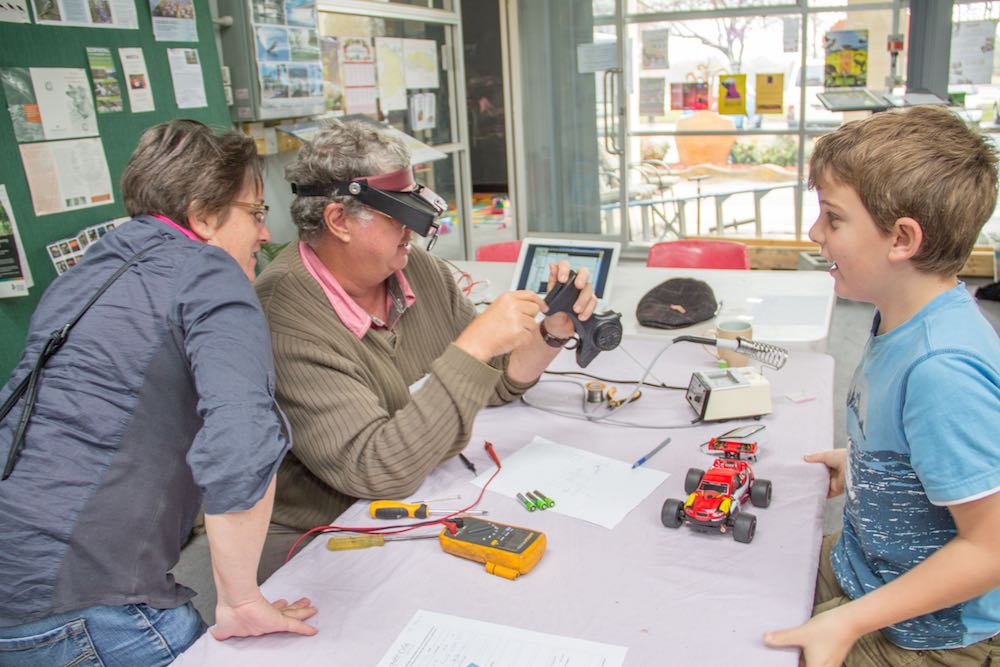Repair Cafés are free meeting places for people to learn the art of repair from experienced volunteers. Visitors bring in a broken household item – a wobbly stool, torn shirt, broken torch or flat bike tyre – and are shown how to fix it. It’s about repairing and restoring, rejecting throw-away society and fostering a culture of creativity, innovation, repair and re-use.
Australia’s Repair Café movement is booming. Ours was the third in Australia and the first in Victoria. Now, two years later, there are a dozen in Victoria alone.
Albury-Wodonga’s Repair Café opens the first Saturday of each month for three hours. We average 18 volunteers per session, manning a reception desk, kitchen and eight work stations. We fix books, bikes, clothing, furniture, battery-operated appliances, jewellery, garden tools and scratched DVDs-CDs. We offer regular special features, including shoe sole gluing, Christmas decorations, even bra repairs.
More than 50 visitors attend each session, bringing an average 65 items, of which 80% get repaired. From a cuckoo clock to a wheelbarrow, shower cap to sheets, a $1,000 figurine and 100-year-old garden shears, the variety of items is astounding. Visitors old and young, rich and poor have embraced our service.
Repair Cafés can be permanent or pop-up, weekly or monthly and operate in anything from a community hall to a café. While cuppas and cakes are usually on offer, the focus is on the fixing. Repairer numbers and repair categories vary widely from one outlet to the next.

Jewellery repairs station
We often get asked how to set up a Repair Café. Here are our top ten steps to success:
- Download the information kit from Repair Café International. It costs around $70 and is an invaluable resource.
- Form a local working group. While some Repair Cafes are coordinated by one person, we recommend forming a small band or at least working with one other. Our group of six to eight meet every month to continuously appraise, innovate and improve our service.
- Reach out to coordinators of other Repair Cafes. Those of us who have been in the game for a while are only too happy to share experiences and resources.
- Seek support from your local council. Their role may be minimal, but it’s great to have them on-side.
- Recruit repairers. Use word of mouth, social media, local radio and newspapers. Base the repair services you offer around the skills of those who volunteer. Consider hosting an introductory training session for all volunteers, to get to know one another, discuss tools and check on technical and interpersonal skills. The backbone of a good Repair Café is a dedicated team of repairers.
- Find a venue. We began as a pop-up service in a senior citizen’s centre and are now in a sustainable activity centre. Other Repair Cafes set up in cafes, community colleges, community centres and even a nursing home.
- Consider applying for seed-funding, to cover venue, insurance and other costs. Crowd-funding, grants and councils are possible options.
- Obtain insurance. Not all Repair Cafes have insurance, but those that do tend to focus on public liability insurance through their venue. We sought more comprehensive coverage, including products liability and volunteers insurance, and eventually obtained an affordable deal through the Australian Men’s Shed Association.
- Reach out to your local professional repairers. Offer to display their business cards and promote their service and explain how the Repair Café culture will benefit them.
- Consider commencing with a trial, to test the community waters and your own willingness to commit. We began with a four session pilot and after that made the call to continue.
Above all be patient and take time to prepare well. It took us half a year to get from inception to reality, but once we started, the rewards were real, tangible and deeply gratifying.
We’re so much more than just a fix-it service. Visitors spill through the doors, asking advice, browsing repair books and mingling with like-minded people. Friendships are forged while stuff is diverted from landfill. Bit by bit we’re challenging the throw-away culture. We think it’s a must for all Transition communities.

Repairers celebrate the 1,000th item brought in for repair
For more information about Repair Café Albury-Wodonga visit our Facebook page or ecoportal.net.au/repair-cafe
Lizette Salmon, Coordinator, Repair Café Albury-Wodonga, February 2018

